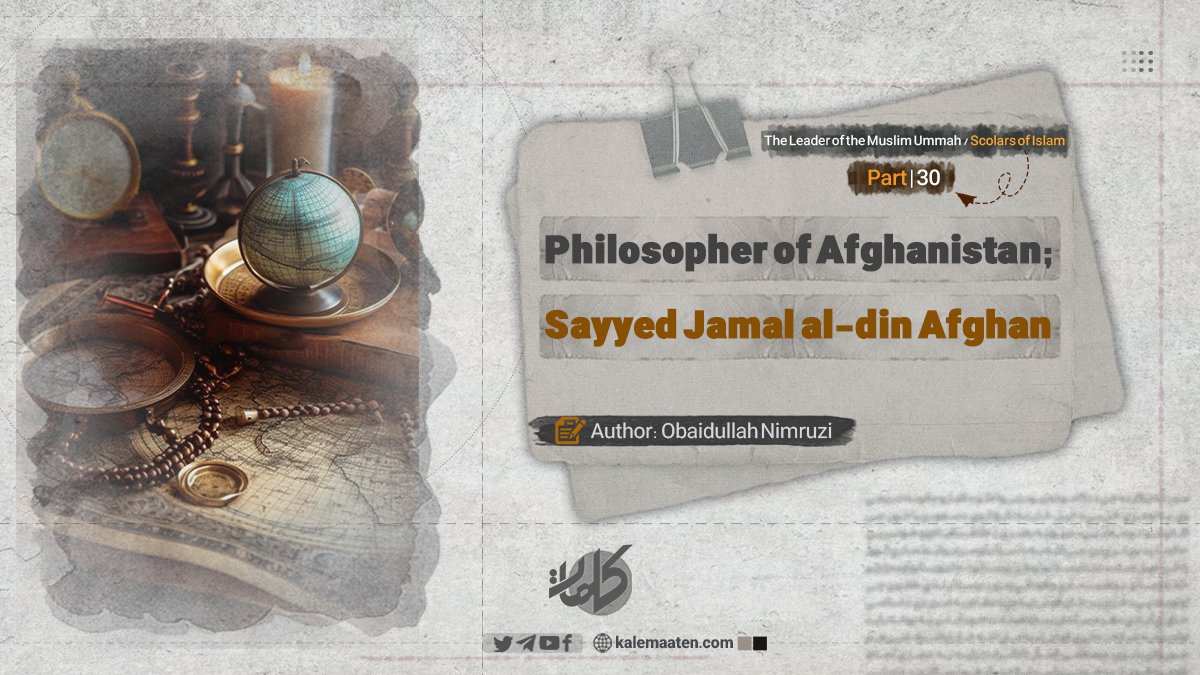
Author: Obaidullah Nimruzi
The Philosopher of Afghanistan: Sayyed Jamal al-din Afghan (Part 30)
Conclusion
The 19th century can be considered a critical period in the history of intellectual and political developments within Islamic societies. On one hand, Western colonialism, through its widespread influence, was threatening the independence of Muslim countries; on the other hand, the traditional internal structures—incapable of confronting new challenges—had surrendered to the wave of colonialism and backwardness. In such a context, Sayyed Jamal al-din Afghan (MABH), as one of the most prominent reformist thinkers, played an unparalleled role in reviving Islamic thought and awakening Muslim societies.
One of the most important centers of Sayyed’s influence was Egypt—a country that held a significant cultural, political, and civilizational position in the Islamic world. His presence in Egypt marked a turning point in the country’s history, as he was able to lay the foundations of a movement whose influence lasted for many years.
The Foundations of Awakening in Egypt Before the Arrival of Sayyed Jamal al-Din
Before Sayyed Jamal al-Din’s arrival in Egypt, the country was struggling with political and economic crises due to the dominance of the Ottoman government and British colonial interference. Although Muhammad Ali Pasha had made efforts to modernize the country, these reforms were primarily aimed at strengthening governmental and military institutions and paid little attention to the intellectual and social awakening of the people.
During the rule of Muhammad Ali’s successors—especially under Ismail Pasha (1863–1879 CE)—Western influence in Egypt increased, and growing economic dependence on Europe pushed the country into financial crisis. In such an atmosphere, a group of Egyptian intellectuals and reformists, led by figures like Rifa‘ah al-Tahtawi, Abdullah Nadim, and Ahmad ‘Urabi, were seeking ways to restore the country’s independence and progress. However, these efforts had not yet evolved into a coherent intellectual and political movement.
Sayyed Jamal al-Din’s Arrival in Egypt and the Beginning of the Awakening Movement
Sayyed Jamal al-din arrived in Egypt in 1871 CE (1288 AH). In a short time, he was able to influence a wide range of elites, youth, and students with his ideas. Sayyed believed that true awakening depended on the revival of Islamic thought, the strengthening of rationality, and the struggle against despotism and colonialism. His most important activities in Egypt can be summarized in several main areas:
1. Establishing an Intellectual Movement and Training Disciples
Sayyed Jamal al-din held discussion and teaching sessions in his home, in the houses of friends, in well-known coffeehouses, and in academic gatherings. One of his main intellectual hubs was the Matatia coffeehouse, which became a meeting place for Egyptian intellectuals and scholars.
He trained prominent students in these sessions who later became Egypt’s political and intellectual leaders. Among them were Muhammad ‘Abduh, Sa‘d Zaghloul, Mahmoud Sami al-Baroudi, Adib Ishaq, Salim Naqqash, ‘Abd al-Salam Mublikhi, Ibrahim Laqqani, Ali Mazhar, and Ibrahim Muwailihi.
Sayyed encouraged his students to write articles on various topics to enhance their writing skills and develop critical thinking and analytical abilities. For example, one day he asked his students to write about “freedom,” and Sa‘d Zaghloul presented an outstanding article on the topic.
2. Disseminating Reformist Ideas Through the Press
Sayyed Jamal al-din realized the importance of the media in spreading reformist ideas. He used newspapers to deliver his messages to the public. In this regard, he collaborated with prominent Egyptian journalists such as Adib Ishaq and Salim Naqqash, and through publications like Al-Waqa’i‘ al-Misriyya and Misr al-Fatat, he spread his ideas.
In his writings, he emphasized the fight against colonialism, the reform of the educational system, the strengthening of rational sciences, and the unity of Muslims. His sharp and critical articles alarmed the Egyptian authorities and the British colonial powers.
3. Supporting the Nationalist Movement of Ahmad ‘Urabi
In the 1870s, Egypt witnessed the emergence of a military and nationalist movement led by Ahmad ‘Urabi, aimed at resisting foreign influence and domestic tyranny. Sayyed Jamal al-din strongly supported this movement and considered it a step toward Egypt’s liberation.
However, in 1882 CE, the British occupation of Egypt brought the movement to an end. After the suppression of Ahmad ‘Urabi’s uprising, Sayyed’s influence in Egypt came under greater threat, and he was eventually exiled from Egypt in 1879 CE.
The Long-Term Impact of Sayyed Jamal al-din in Egypt
Although Sayyed Jamal al-din did not stay in Egypt for long, his influence left a deep imprint on the intellectual and political history of the country. Some of the key outcomes of his activities include:
1.Establishing a Reformist Religious and Intellectual Movement: His students, especially Muhammad ‘Abduh, continued the path of religious reform and contributed to the founding of the modern Salafi movement and the renewal of Islamic thought.
2.Strengthening National and Anti-Colonial Identity: Sayyed’s ideas led Egyptians to increasingly recognize the importance of independence and resistance against colonialism.
3.Laying the Groundwork for the 1919 Revolution: Sa‘d Zaghloul, one of Sayyed’s students, led a major revolution against the British in 1919 and became the first prime minister elected by the Egyptian people.
4.Transforming the Role of the Press and Media: Under Sayyed’s influence, journalism in Egypt evolved into a tool for enlightenment and political activism.
In a Word!
The awakening movement that Sayyed Jamal al-din Afghan initiated in Egypt was one of the most significant reformist movements in the modern history of Islam. By promoting rational thinking, nurturing intellectuals, spreading reformist ideas, and supporting anti-colonial movements, he laid the foundation for transformations whose effects lasted for decades.
Though authoritarian regimes and colonial powers tried to limit his influence, Sayyed’s ideas remained alive among Muslim intellectuals and thinkers, continuing to inspire many freedom movements throughout the Islamic world.
Continues…


